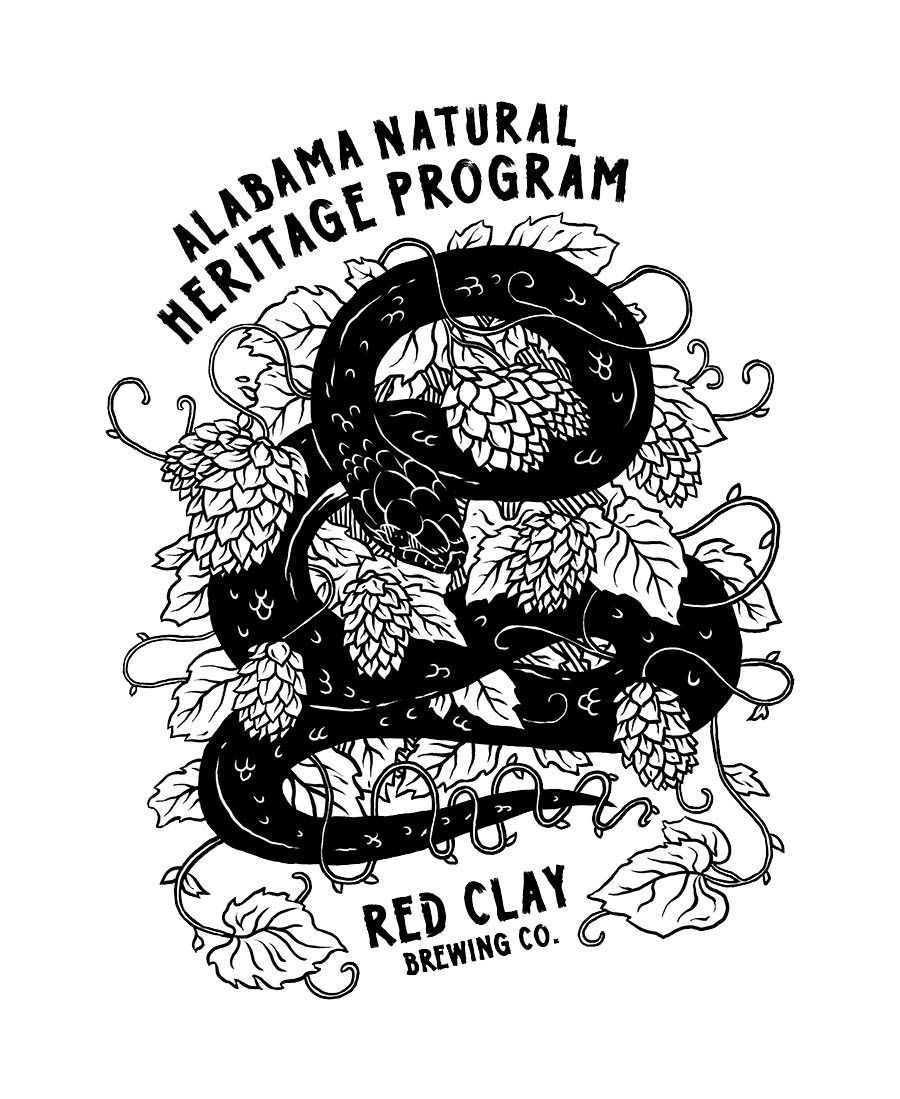COSAM News Articles 2017 February Auburn University’s Museum of Natural History and Red Clay Brewery partner to conserve Alabama wildlife
Auburn University’s Museum of Natural History and Red Clay Brewery partner to conserve Alabama wildlife
“Drink Beer! Save a Species!” is the new mantra of the College of Sciences and Mathematics’ Alabama Natural Heritage Program, which has teamed up with Red Clay Brewery in Opelika to conserve native Alabama wildlife. Beginning Thursday, Feb. 23, one dollar of each pint sold of a new brew, Drymarchon Berliner Weisse, will benefit conservation efforts of COSAM scientists who are working to reintroduce the Eastern Indigo snake to the Alabama landscape.
The partnership will officially kickoff on Thursday, Feb. 23 at 6:30 p.m. at a special “Science Pub” event featuring guest scientist Jason Bond, professor and chair of the Department of Biological Sciences. Bond will give a presentation titled, “Do Spiders Really Have Superpowers?”
The Science Pub kickoff at Red Clay Brewery is sponsored by COSAM’s Office of Outreach. The event is family friendly and open to all ages. There is no cost to attend.
Leading the partnership effort to benefit the Eastern Indigo snake is David Steen, a faculty member in the Department of Biological Sciences and researcher with COSAM’s Alabama Natural Heritage Program. Steen is a conservation biologist and wildlife ecologist who is well known on Twitter @alongsidewild for his scientific outreach and willingness to provide snake identification services. He said he feels compelled to share his herpetological knowledge with the public in an effort to dispel the negative stigma associated with snakes.
“Snakes are just animals like any other animal,” said Steen. “Their bad reputation is something we’ve put on them. Snakes play important roles in the environment as predators and prey, help reduce pests and disease, and they’re just cool to have around!”
The Eastern Indigo snake is the largest native snake in the U.S. and could be found in the wilds of south Alabama until the mid-20th century. The species disappeared from the state due to a variety of factors, including loss and degradation of their natural habitat, over collection associated with the pet trade, excessive mortality from automobiles, and gassing of their winter refuges - tortoise burrows - to catch rattlesnakes.
To re-establish the Eastern Indigo to its native habitat in Alabama, COSAM researchers have been releasing juvenile Eastern Indigos into Conecuh National Forest since 2011. Ongoing monitoring efforts suggest that many of the 107 snakes released so far are quickly growing in size and some have begun to reproduce.
Eastern Indigo snakes are an important component of Alabama’s natural landscapes for a number of reasons. Notably, they feed on other snakes, including venomous Copperheads. Researchers are currently monitoring how populations of Copperheads change after Indigo snakes are reintroduced.
Additionally, scientists are working to restore the longleaf forest, a globally imperiled ecosystem, in Alabama. To do so, all of the pieces need to be put back into place, including Eastern Indigo snakes.
“Every time we lose a species, whether we are talking about a species going extinct or whether it simply disappeared from the woods near your house, we lose a part of our natural and cultural heritage,” said Steen. “We should be proud of our wildlife. They are part of our identity.”
Alabama ranks fifth in the nation in overall biodiversity, and the Alabama Natural Heritage Program monitors more than 1,500 species in the state, including a variety of birds, mammals, reptiles, amphibians, fishes, spiders, insects and plants. The Alabama Natural Heritage Program has recorded 63 extinct species that once occurred in Alabama, and approximately 717 species are critically imperiled due to extreme rarity.
In addition to collecting and providing the best available scientific information on the biological diversity of Alabama, the Alabama Natural Heritage Program guides conservation action and promotes sound stewardship practices within the state and throughout the Southeast.
For more information on the Alabama Natural Heritage Program, visit the Auburn University Museum of Natural History website. For more information on the Science Pub kickoff event on February 23, visit COSAM’s Office of Outreach website.
Latest Headlines
-
02/12/2025
-
02/11/2025
-
02/10/2025
-
01/30/2025
-
12/03/2024

